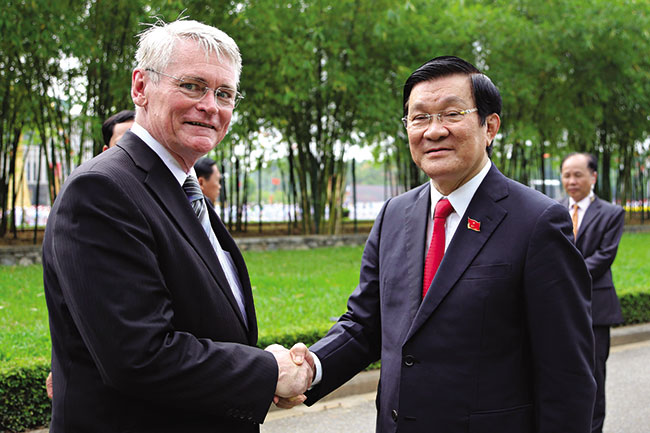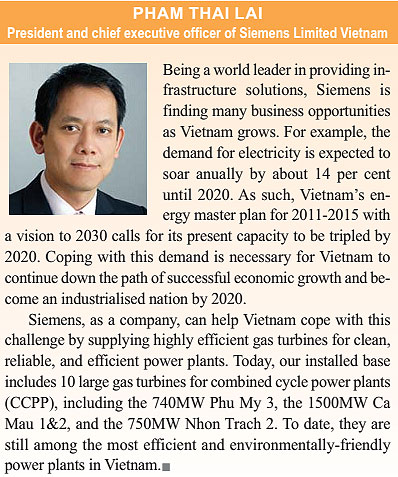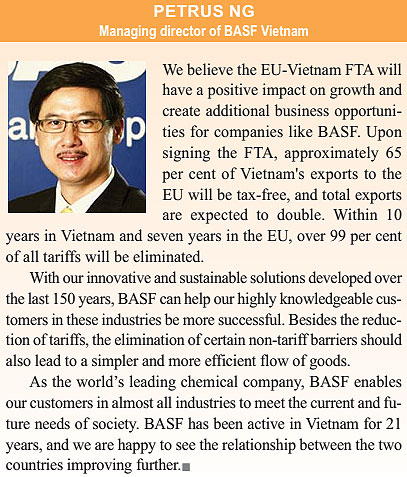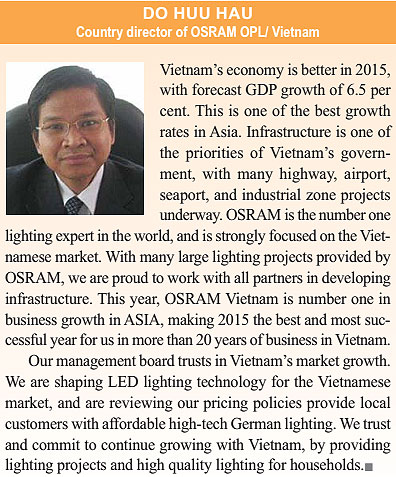Paving a road for German business

Germany and Vietnam are further cementing their political and economic ties
At last week’s press conference organised by the German Embassy in Vietnam, Hans-Jörg Brunner, Charge d’Affaires of the embassy, said that Vietnam was quite an attractive investment destination for German firms.
“Many German firms are keen to enter Vietnam to do business in many sectors. It is thanks to the two countries’ ever-increasing political and economic ties, and the free trade agreements between Vietnam and the European Union,” he said.
Further investment and business co-operation
Over 300 German companies are operating and investing in Vietnam in many sectors, notably in automobile, machinery, pharmacy, and construction material.
Specifically, representatives from Germany’s famous auto brands, such as Audi, Porsche, and BMW, said increasing income and demand for automobiles in Vietnam had prompted them to expand business in the country.
Laurent Genet, general director of Automotive Asia Ltd – the official Audi importer and distributor in Vietnam and Cambodia, said Audi would open another showroom in Danang city in October 2015, in addition to Audi’s several existing showrooms in Hanoi and Ho Chi Minh City. Meanwhile, BMW’s Business and Marketing manager Nguyen Dang Thao said: “Vietnam is one of the most important growth markets for the BMW Group in the region. We will strengthen our market position by developing the sales and services network.”
Andreas Klingler, general director of Prestige Sports Cars Company Limited, which is the official importer of Porsche in Vietnam, also said: “Porsche will expand business in Vietnam by luring the new Vietnamese generations with its entire model range.”
Currently the majority of machinery in Vietnam’s food processing, textile manufacturing, and medical device sectors are made in Germany. Foreign media reported that the German Engineering Federation Textile Machinery Association, whose members occupied 90 per cent of Germany’s textile machinery manufacturing value, made $3.6 billion of textile machinery in 2014. Vietnam is a prime market for these machines. Additionally, German food processing machine companies profited from about $391 million worth of sales from January-November 2014 in Vietnam.
In the material construction sector, many German firms are introducing their environmentally-friendly technology into Vietnam, like ThyssenKrupp, Loesche, Knauf, and Rieckermann.
ThyssenKrupp is seeking local partners to sell its second-generation cement grinding solutions, which have been applied in Cong Thanh cement plant in Thanh Hoa province. In late 2014, ThyssenKrupp opened a factory producing ammonium nitrate in Thai Binh province, meeting 80 per cent of Vietnam’s demand for this substance, which is used as a high-nitrogen fertiliser, and in making explosives for mining.
Loesche Gmbh’s Southeast Asia business director Philipp Stolzengurg said “We want more partners in Vietnam. Our cement mills can fully satisfy our clients’ needs in regard to cement fineness, particle size distribution, water demand, setting time, and compressive strength.”
Recently, Knauf Vietnam began operation of its first $33.6 million plant in Dinh Vu Industrial Zone in Haiphong city. Covering 63,000 square metres, the plant annually produces 12 million sqm of gypsum board and 15 million linear metres of metal profile. “We are expanding our relationship with distributors, architects, developers, and government authorities to widely introduce our products,” said Knauf Vietnam general director David Thomas.
In terms of medical equipment, Vietnam currently hosts big German well operating firms, including Siemens, Draeger Medical, Fresenius Kabi, Bayer Schering Pharma, and Merck.
As of August 20, 2015, Germany had 259 valid investment projects in Vietnam, registered at $1.38 billion.
Big propellants
Brunner said the two countries’ ever-growing political and economic relations would continue serveing as a firm foundation to cement their investment ties.
He said Vietnam’s State President Truong Tan Sang was expected to pay a state visit to Germany in November.
Last November, the Asia-Pacific Conference of German business took place in Ho Chi Minh City, with over 850 leaders of German firms attending. “The conference was a clear sign of the confidence and trust that German companies have in the economic environment of Asia in general, and Vietnam in particular,” Brunner noted.
Last week, Vietnam’s Ministry of Foreign Affairs (MoFA), German Chamber of Commerce and Industry, and German Business Association signed a co-operation deal which will be used to boost German investment and trade in Vietnam.
The two sides will help Vietnam’s localities devise policies to lure German investments. They will frequently hold investment promotion forums and conferences in the localities.
Additionally, Germany and Vietnam are expected to soon establish their joint chamber of commerce, whose membership will be both Vietnamese and German firms. It is expected that the chamber will help spur trade, and increase long-term German investments in Vietnam.
On the Day of German Unity (October 3), several German firms told VIR that they were quite bullish over their business prospects in Vietnam, thanks to the country’s bright economic outlook and free trade agreement to be inked with the EU   |
What the stars mean:
★ Poor ★ ★ Promising ★★★ Good ★★★★ Very good ★★★★★ Exceptional
 Tag:
Tag:
Related Contents
Latest News
More News
- Hermes joins Long Thanh cargo terminal development (February 04, 2026 | 15:59)
- SCG enhances production and distribution in Vietnam (February 04, 2026 | 08:00)
- UNIVACCO strengthens Asia expansion with Vietnam facility (February 03, 2026 | 08:00)
- Cai Mep Ha Port project wins approval with $1.95bn investment (February 02, 2026 | 16:17)
- Repositioning Vietnam in Asia’s manufacturing race (February 02, 2026 | 16:00)
- Manufacturing growth remains solid in early 2026 (February 02, 2026 | 15:28)
- Navigating venture capital trends across the continent (February 02, 2026 | 14:00)
- Motivations to achieve high growth (February 02, 2026 | 11:00)
- Capacity and regulations among British areas of expertise in IFCs (February 02, 2026 | 09:09)
- Transition underway in German investment across Vietnam (February 02, 2026 | 08:00)





















 Mobile Version
Mobile Version